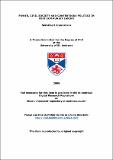Files in this item
Power, civil society and contentious politics in post communist Europe
Item metadata
| dc.contributor.advisor | Fawn, Rick | |
| dc.contributor.author | Cruickshank, Neil A. | |
| dc.coverage.spatial | 315 | en |
| dc.date.accessioned | 2008-11-25T11:01:39Z | |
| dc.date.available | 2008-11-25T11:01:39Z | |
| dc.date.issued | 2008-11-27 | |
| dc.identifier.uri | https://hdl.handle.net/10023/559 | |
| dc.description.abstract | This dissertation examines how contentious collective action in two post communist states, Poland and the Czech Republic, has broadened to include European and international actors. It identifies the emergence of new opportunities for contention brought about by recent episodes of institutional change, specifically EU accession, and questions how they benefit materially or politically weak NGOs. With the intention of determining how three interrelated processes, democratization, Europeanization and internationalization, affect the nature and scope of contentious politics, this dissertation carries out an investigation of several concrete episodes of political mobilization and contention. As shown these 'contentious events' involved a myriad of national, European and international actors, mobilizing to challenge national policy. Data from NGO questionnaires, interviews and newswire/newspaper archives are used to discern the nature and scope of contentious collective action. This dissertation assesses the extent to which transnationalization of advocacy politics has disrupted existing power arrangements at the national level between NGOs and government. Hypothesizing that European Union accession in 2004 changed the nature and scope of contentious collective action in post communist Europe, this dissertation undertakes a comparative empirical examination of three sectors, environment, women and Roma, and twenty-nine representative NGOs. My research identifies three important developments in the Polish and Czech nonprofit sector: first, European advocacy networks and institutions are helping national NGOs overcome power disparities at the national level; second, issues once confined to national political space have acquired a European dimension, and; third, despite Europeanization, a few notable policy issues (i.e. reproductive rights, nuclear energy and domestic violence) remain firmly under national jurisdiction. This dissertation contributes to existing collective action/post communist scholarship in three ways. It applies established theories of contention/collective action to several recent episodes of political mobilization; it confirms that post accession institutional change does offer new political opportunity structures to national NGOs, and finally; it presents new empirical research on post communist collective action. | en |
| dc.format.extent | 1635583 bytes | |
| dc.format.mimetype | application/pdf | |
| dc.language.iso | en | en |
| dc.publisher | University of St Andrews | |
| dc.subject | Contentious politics | en |
| dc.subject | European Union | en |
| dc.subject | Roma | en |
| dc.subject | Environmental groups | en |
| dc.subject | Poland | en |
| dc.subject | Czech Republic | en |
| dc.subject | NGOs | en |
| dc.subject | Advocacy networks | en |
| dc.subject | Women's rights | en |
| dc.title | Power, civil society and contentious politics in post communist Europe | en |
| dc.type | Thesis | en |
| dc.type.qualificationlevel | Doctoral | en |
| dc.type.qualificationname | PhD Doctor of Philosophy | en |
| dc.publisher.institution | The University of St Andrews | en |
This item appears in the following Collection(s)
Items in the St Andrews Research Repository are protected by copyright, with all rights reserved, unless otherwise indicated.

